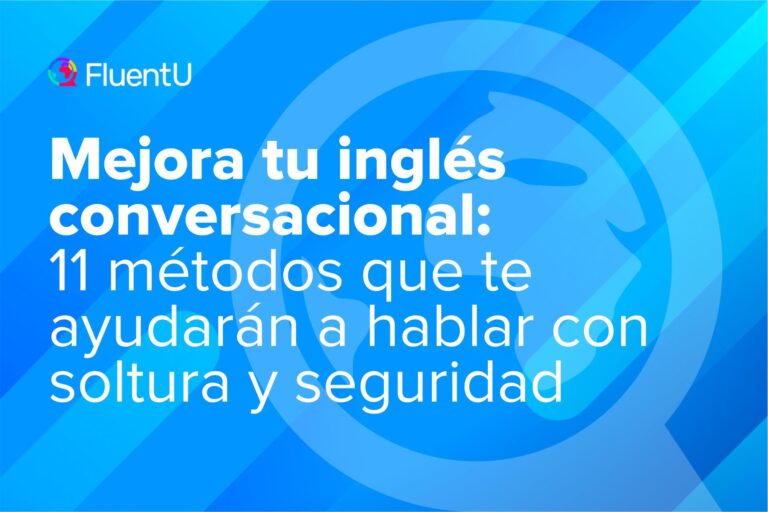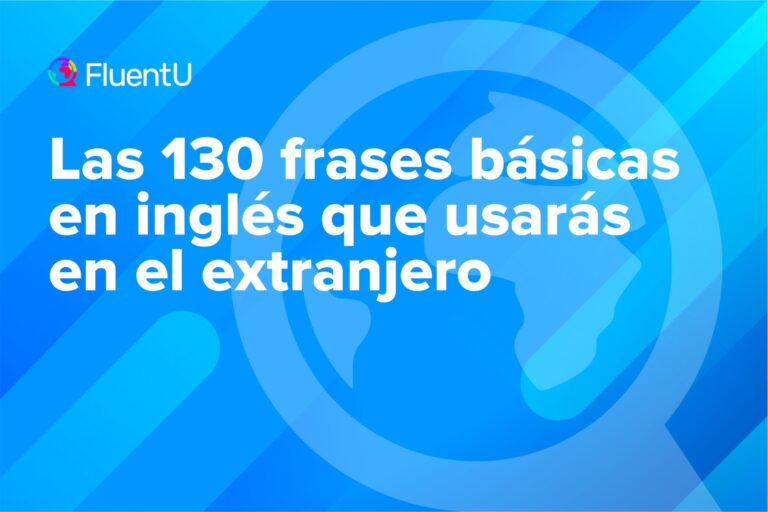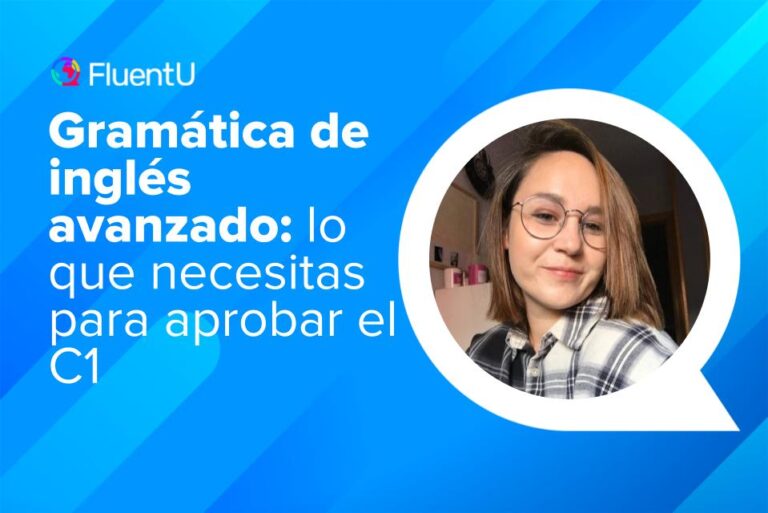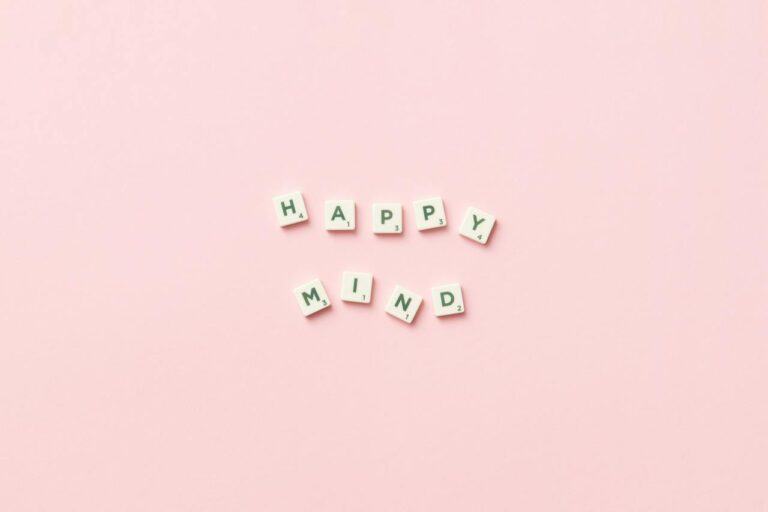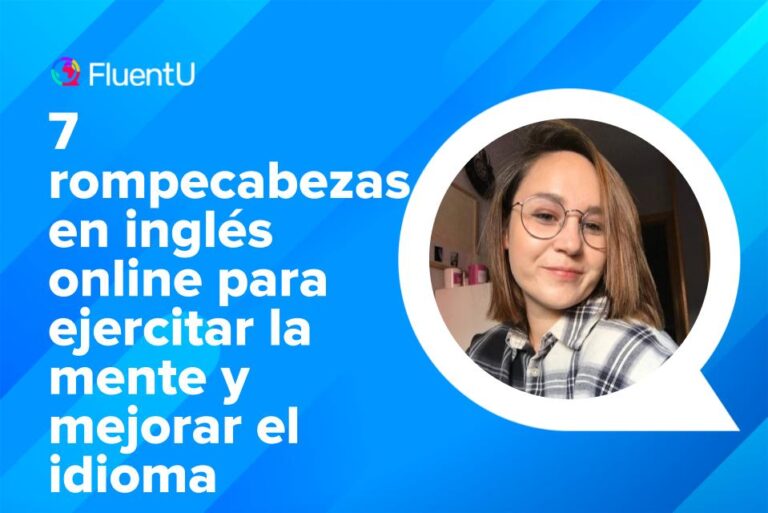Contents
Conversaciones en inglés: ¡10 ejemplos de conversación y frases extra para practicar!
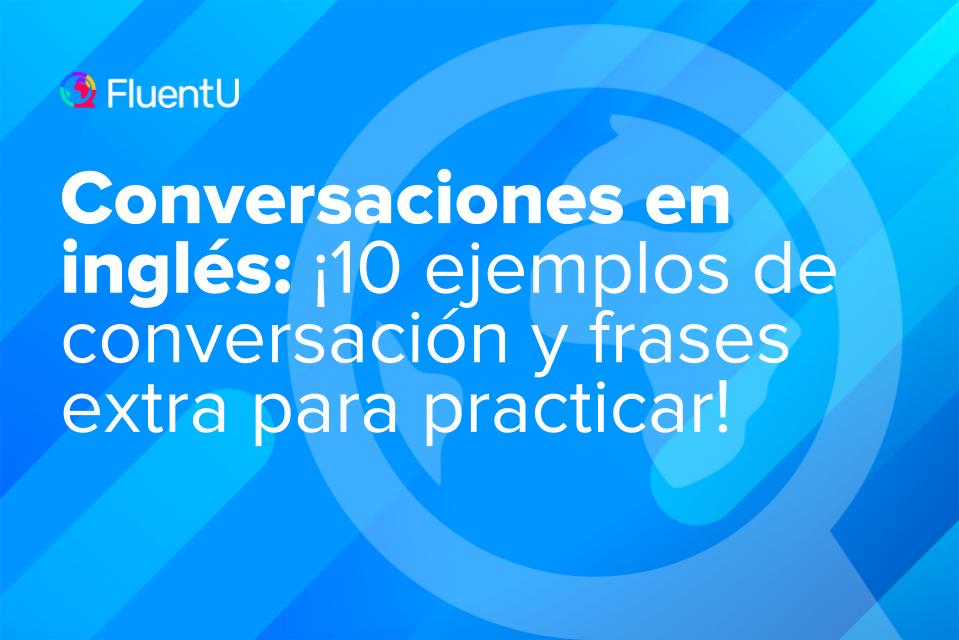
Ser capaz de hablar con otras personas en inglés puede abrirte un sinfín de oportunidades, te permite escuchar ideas y opiniones de personas de diferentes culturas, ¡y hasta puede que hagas amigos para toda la vida!
Si sales de tu zona de confort y tienes conversaciones en inglés, ¡te motivarás para seguir aprendiendo! Además, tu inglés mejorará mucho si hablas más.
Hemos creado esta guía con conversaciones en diferentes situaciones y contextos. ¿Las vemos?
Download: This blog post is available as a convenient and portable PDF that you can take anywhere. Click here to get a copy. (Download)
1. Iniciar una conversación
Con alguien que no conoces:
Persona 1: Hi, how are you?
Persona 2: I’m good, thank you. And you?
Persona 1: I’m doing well, thank you.
Persona 2: So, are you from around here?
Persona 1: No, I’m actually visiting. How about you?
Persona 2: I live here. What brings you to town?
Persona 1: Just some sightseeing and exploring. Do you have any recommendations?
Persona 2: Yeah, there are some great restaurants and museums in the area. Have you checked out the park yet?
Persona 1: No, I haven’t had the chance yet. Thanks for the suggestion!
Traducción:
Persona 1: Hola, ¿cómo estás?
Persona 2: Estoy bien, gracias. ¿Y tú?
Persona 1: Bien, gracias.
Persona 2: ¿Eres de por aquí?
Persona 1: No, estoy de visita. ¿Y tú?
Persona 2: Vivo aquí. ¿Qué te trae por aquí?
Persona 1: Estoy haciendo turismo. ¿Qué me recomiendas?
Persona 2: Tienes unos cuantos buenos restaurantes y museos por la zona. ¿Has ido al parque?
Persona 1: Todavía no. ¡Gracias por las recomendaciones!
Con un amigo:
Persona 1: Hey! Long time no see! How have you been?
Persona 2: I’ve been doing pretty well, thanks for asking. It’s so good to see you!
Persona 1: It’s great to see you too! What have you been up to lately?
Persona 2: Well, I started a new job a few months ago and I’ve been really enjoying it. I also went on a trip to Europe last summer.
Persona 1: Wow, that sounds amazing! I’m so happy for you.
Persona 2: Thanks! What about you? How’s everything been going?
Persona 1: Things have been good. I recently moved into a new apartment and started taking some classes at the community center.
Persona 2: That’s awesome! How are you liking the new place?
Persona 1: It’s been great so far. You’ll have to come check it out sometime!
Traducción:
Persona 1: ¡Hola! ¡Cuánto tiempo sin vernos! ¿Cómo estás?
Persona 2: Bastante bien, gracias por preguntar. ¡Me alegro mucho de verte!
Persona 1: ¡Lo mismo digo! ¿Qué te cuentas?
Persona 2: Pues tengo nuevo trabajo desde hace unos meses y estoy muy bien. También fui de viaje por Europa el verano pasado.
Persona 1: Vaya, ¡qué bien! Me alegro mucho por ti.
Persona 2: ¡Gracias! ¿Y tú? ¿Qué tal todo?
Persona 1: Bien. Hace poco me mudé y he empezado a dar clases en el centro comunitario.
Persona 2: ¡Qué guay! ¿Qué tal en la nueva casa?
Persona 1: De momento bien. ¡Tienes que venir algún día!
2. En un restaurante
Camarero: Good evening, welcome to our restaurant. Can I start you off with some drinks?
Persona 1: Yes, I’ll have a glass of red wine, please.
Persona 2: I’ll have a beer, please.
Camarero: Great, and are you ready to order or do you need a few more minutes?
Persona 1: We need a little more time, please.
Camarero: No problem, take your time. If you have any questions about the menu, I’d be happy to help.
Persona 2: Actually, could you recommend something? What’s your favorite dish here?
Camarero: Of course! I highly recommend the grilled chicken with roasted vegetables. It’s one of our most popular dishes.
Persona 1: That sounds great, I think I’ll get that.
Persona 2: And I’ll have the fish with rice.
Camarero: Excellent choices. I’ll put that in for you right away.
Traducción:
Camarero: Buenas noches, bienvenidos a nuestro restaurante. ¿Qué quieren tomar?
Persona 1: Una copa de vino tinto, por favor.
Persona 2: Yo una cerveza, por favor.
Camarero: Perfecto, ¿ya saben lo que quieren o necesitan unos minutos más?
Persona 1: Necesitamos un poco más de tiempo, por favor.
Camarero: Sin problema, tómense el tiempo que necesiten. Si tienen alguna pregunta sobre el menú, estaré encantado de ayudarlos.
Persona 2: ¿Qué nos recomiendas? ¿Cuál dirías que es tu plato favorito de aquí?
Camarero: Les recomiendo el pollo a la parrilla con verduras asadas. Es uno de nuestros platos más populares.
Persona 1: Suena bien, creo que pediré eso.
Persona 2: Y yo pediré el pescado con arroz.
Camarero: Excelentes elecciones. Enseguida lo tendrán.
3. En una tienda de ropa
Persona: Excuse me, can you help me find something?
Dependiente: Of course, what are you looking for?
Persona: I need a new pair of jeans, but I’m not sure what size I am.
Dependiente: Well, we have a measuring tape if you want to find out your size.
Persona: That would be great, thanks.
Dependiente: Okay, based on your measurements, I would recommend trying on a size 8 or 10.
Persona: Thanks for your help.
Traducción:
Persona: Disculpe, ¿me puede ayudar?
Dependiente: Por supuesto, ¿qué estás buscando?
Persona: Necesito unos vaqueros, pero no estoy segura de la talla que necesito.
Dependiente: Te puedo coger las medidas para saber tu talla.
Persona: Perfecto, sí. Gracias.
Dependiente: Bien, según tus medidas, te recomendaría una talla 8 o 10.
Persona: Gracias por tu ayuda.
4. Comprando maquillaje
Persona: Hi, I’m looking for a new foundation. Can you help me find one that matches my skin tone?
Dependienta: Of course, let me take a look at your skin. I think this shade would be a good match for you. Would you like me to apply it so you can see how it looks?
Persona: Yes, please. (Sales Clerk applies the foundation and gives them a mirror to check their reflection)
Persona: Wow, it looks great! I’ll take it.
Dependienta: Great! Is there anything else you need?
Persona: No, that’s all for now.
Traducción:
Persona: Hola, busco una base de maquillaje. ¿Me puedes ayudar a encontrar una que coincida con mi tono de piel?
Dependienta: Claro que sí, dévame ver tu piel. Creo que este tono te quedaría bien. ¿Quieres que te lo aplique para ver cómo queda?
Persona: Sí, por favor. (La dependienta le aplica la base y le da un espejo para mirarse)
Persona: Me gusta mucho. Me lo llevo.
Dependienta: ¡Perfecto! ¿Necesitas algo más?
Persona: No, eso es todo.
5. Comprando un billete de tren
Persona: Hi, I’d like to buy a train ticket, please.
Taquillero: Sure, where are you traveling to?
Persona: I’m going to Birmingham.
Taquillero: And when do you plan to travel?
Persona: I’d like to leave on Friday morning and return on Monday evening.
Taquillero: Okay, let me check for you.
(Ticket Clerk types on the computer and prints out the ticket)
Taquillero: Here you go. That will be 50 euros.
Persona: Thank you.
Taquillero: Enjoy your trip.
Traducción:
Persona: Hola, quisiera comprar un billete de tren, por favor.
Taquillero: Claro, ¿a dónde quieres ir?
Persona: A Birmingham.
Taquillero: ¿Y para cuándo?
Persona: Me gustaría salir el viernes por la mañana y regresar el lunes por la noche.
Taquillero: De acuerdo, déjame ver.
(El taquillero escribe en el ordenador e imprime el billete)
Taquillero: Aquí tienes. Son 50 euros.
Persona: Gracias.
Taquillero: Buen viaje.
6. En una boda o en un evento formal
Persona 1: Hi, I’m Anne, a friend of the bride. And you are?
Persona 2: Hi, nice to meet you. I’m Dan, a colleague of the groom.
Persona 1: It’s a beautiful wedding, isn’t it?
Persona 2: Yes, it is. The decorations are amazing.
Persona 1: Have you known the groom for long?
Persona 2: Not really. We’ve only worked together for a few months, but he seems like a great guy. How about you and the bride?
Persona 1: We met in college and have been friends ever since. It’s so nice to see her happy.
Persona 2: That’s wonderful. It’s always great to have lifelong friends.
Persona 1: Yes, it is.
Traducción:
Persona 1: Hola, soy Anne, un amiga de la novia. ¿Y tú?
Persona 2: Encantado. Soy Dan, compañero de trabajo del novio.
Persona 1: Una boda preciosa, ¿verdad?
Persona 2: Sí, la decoración es muy bonita.
Persona 1: ¿Conoces al novio desde hace mucho?
Persona 2: La verdad es que no. Llevamos trabajando juntos unos meses, pero es un buen tipo. ¿Y tú y la novia?
Persona 1: Nos conocimos en la universidad y somos amigas desde entonces. Me alegro tanto por ella.
Persona 2: Qué bien. Es fantástico tener amigos de toda la vida.
Persona 1: La verdad es que sí.
7. En una primera cita
Persona 1: Hey, it’s really nice to finally meet you!
Persona 2: Yeah, I feel the same way! You look amazing, by the way.
Persona 1: Thanks! So, what do you feel like doing tonight?
Persona 2: I’m up for anything, really. What about you?
Persona 1: Well, I heard there’s a new bar with live music downtown. How about we check it out?
Persona 2: Sounds great! Let’s do it.
Persona 1: Awesome. And if the music sucks, we can always just talk and get to know each other better.
Person 2: Haha, fair enough. I’m looking forward to it.
Traducción:
Persona 1: ¡Hola! ¡Por fin nos conocemos!
Persona 2: ¡Pues sí! Estás muy guapa, por cierto.
Persona 1: ¡Gracias! ¿Qué te apetece hacer esta noche?
Persona 2: Estoy abierto a cualquier cosa, ¿y tú?
Persona 1: He oído hablar de que hay un nuevo bar con música en vivo en el centro. ¿Te parece bien?
Persona 2: ¡Por mí bien!
Persona 1: Perfecto. Y si no nos gusta la música, podemos hablar y conocernos mejor.
Persona 2: Jaja, exacto. Qué ganas.
8. Conferencias o eventos donde ampliar red de contactos
Persona 1: Hi there, my name is Jack. What brings you to this networking event?
Persona 2: Hi Jack, I’m Rachel. Nice to meet you. I’m here to meet new people and hopefully make some professional connections. How about you?
Persona 1: Same here, Rachel. I work in marketing and I’m always looking to expand my network. What field do you work in?
Persona 2: I work in finance, specifically in investment banking.
Persona 1: Oh, interesting. I don’t know much about that field, but I’d love to learn more. Do you know of any good panels or talks that are happening later today?
Persona 2: Actually, there’s a panel on the future of finance that I’m planning to attend. It starts in about an hour. Want to join me?
Persona 1: That sounds great, I’d love to. Let’s exchange contact information so we can stay in touch after the event.
Traducción:
Persona 1: Hola, soy Jack. ¿Qué te trae por este evento?
Persona 2: (Hola Jack, soy Rachel. Encantada. Estoy aquí para conocer gente nueva y hacer nuevos contactos profesionales. ¿Y tú?
Persona 1: Lo mismo, Rachel. Trabajo en marketing y siempre estoy buscando ampliar mi red de contactos. ¿En qué campo trabajas?
Persona 2: Trabajo en finanzas, específicamente en banca de inversión.
Persona 1: Qué interesante. Aunque no sé mucho, me encantaría saber más. ¿Sabes si hay algún panel o charla al respecto hoy?
Persona 2: Sí, hay un panel sobre el futuro de las finanzas al que tengo pensado ir. Comienza en una hora. ¿Quieres venirte?
Persona 1: Claro, me encantaría. Vamos a darnos los números para estar en contacto después del evento.
9. En un hotel
Recepcionista: Good afternoon, welcome to the Grand Hotel. How may I assist you?
Huésped: Hi, I have a reservation under the name Smith for a double room.
Recepcionista: Certainly, let me check your reservation.
Huésped: Okay, no problem.
Recepcionista: Yes, Mr. Smith, we have your reservation for a double room. May I have your ID and a credit card, please?
Huésped: Sure, here’s my ID and credit card.
Recepcionista: Thank you, Mr. Smith. Here is your key card for room 215. Breakfast is served from 6:00 a.m. to 10:00 a.m. on the second floor.
Huésped: Great, thank you.
Traducción:
Recepcionista: Buenas tardes, bienvenido al Gran Hotel. ¿En qué puedo ayudarlo?
Huésped: Hola, tengo una reserva a nombre de Smith para una habitación doble.
Recepcionista: Deje que busque la reserva.
Huésped: Claro.
Recepcionista: Sí, señor Smith, tenemos su reserva para una habitación doble. ¿Puedo ver su documento de identidad y una tarjeta de crédito, por favor?
Huésped: Claro, aquí tiene.
Recepcionista: Gracias, señor Smith. Aquí está su tarjeta llave para la habitación 215. El desayuno se sirve de 6:00 a.m. a 10:00 a.m. en la segunda planta.
Huésped: Perfecto, gracias.
10. Conversaciones de ascensor
Persona 1: Nice weather we’re having today, isn’t it?
Persona 2: Yeah, it’s great. I always feel more energized on sunny days.
Persona 1: I know what you mean. Have any fun plans for the weekend?
Persona 2: Not really, just taking it easy. How about you?
Persona 1: Same here, just catching up on some reading and maybe watching a movie.
Persona 2: Sounds like a good way to relax. What kind of books do you like?
Persona 1: Mostly fiction, but I also enjoy some non-fiction, especially history and science. How about you?
Persona 2: I’m more of a non-fiction person myself, but I do like some sci-fi and fantasy.
Persona 1: Ah, cool. Any recommendations?
Persona 2: Have you read “The Martian”? It’s a great sci-fi novel.
Persona 1: No, but I’ve heard good things about it. I’ll have to check it out.
Persona 2: Definitely do. Well, it was nice talking to you.
Persona 1: Likewise. Have a good one.
Traducción:
Persona 1: Se ha quedado buen día, ¿verdad?
Persona 2: Sí, se está genial. Me dan la vida los días con sol.
Persona 1: Sí, a mí también. ¿Vas a hacer algo divertido el fin de semana?
Persona 2: No, la verdad. Finde de relax.
Persona 1: Yo igual. Lo pasaré leyendo y quizás vea alguna película.
Persona 2: Un buen plan. ¿Qué tipo de libros te gustan?
Persona 1: Sobre todo ficción, pero también disfruto de algunos no ficción, como historia y ciencia. ¿Y a ti?
Persona 2: Yo soy más de no ficción, pero también me gusta la ciencia ficción y la fantasía.
Persona 1: Qué bien. ¿Qué me recomiendas?
Persona 2: ¿Has leído Marte? Es una gran novela de ciencia ficción.
Persona 1: No, pero oído hablar de ella. Tendré que echarle un ojo.
Persona 2: Deberías. Bueno, ha sido un placer hablar contigo.
Persona 1: Igualmente. Que tengas un buen día.
Este tipo de conversaciones, llamadas small talks, es muy común, sobre todo en Estados Unidos, Canadá e Inglaterra.
Frases extra
Otras formas de saludar
Si necesitas un empujón para empezar a hablar con gente, motívate con este vídeo. Ten en cuenta que cualquier conversación comienza con un saludo (greeting).
Hay muchas formas de saludar a alguien, y lo que elijas dependerá de con quién estés hablando:
Saludos informales
- Hello!: Un saludo universal que funciona en todas las conversaciones
- Hi!: Un saludo neutral y amigable
- Hey!: Un saludo informal y desenfadado
- Greetings!: Bastante formal y poco utilizada hoy en día, pero puede utilizarse de manera humorística entre amigos
Saludos formales
- Good morning!: Para cualquier hora antes del medio día
- Good afternoon!: Normalmente se utiliza entre el medio día y las 5-6 de la tarde
- Good evening!: Cualquier hora después de las 6 de la tarde
Otras formas de presentarse
- My name is ___. What’s your name?
Me llamo ___. ¿Y tú?Si ya conocías a alguien pero no te acuerdas de su nombre, di:
- I’m sorry, I don’t remember your name. You are… ?
Lo siento, pero no me acuerdo de tu nombre. ¿Eres…?Si quieres presentarle a alguien a una persona:
- Please meet + [name]
Te presento a [nombre]
- This is + [name]
Este es [nombre]
Y para responder:
- Nice to meet you!
¡Encantado de conocerte!
- Pleasure to meet you!
¡Un placer conocerte!
- It’s a pleasure!
¡Es un placer!
Más preguntas para continuar una conversación
- Are you having a good day?
¿Estás teniendo un buen día?
- Did you just get to the office?
¿Acabas de salir de la oficina?
- Have you seen my email?
¿Viste mi email? - How is your day going?
¿Qué tal el día?
(¡Un ejemplo perfecto de conversación de ascensor!) - When did you arrive at the office?
¿Cuándo llegaste a la oficina?
- What do you think about that email I sent?
¿Qué piensas del email que te mandé?
Las preguntas que empiezan con who, what, where, when y why son importantes para hacer que tu conversación en inglés sea más informativa y productiva. Mira más ejemplos aquí.
Para que te aclaren una pregunta
- I’m sorry, I don’t understand. Could you please repeat that?
Lo siento, no lo he entendido. ¿Podrías repetirlo?
- I’m sorry, I don’t understand. Could you please explain that?
Lo siento, no lo he entendido. ¿Podrías explicarlo?
- Care to elaborate?
¿Te importa explicarlo con más detalle?
(Esta pregunta tan informal es la versión corta de Do you care to elaborate on this?) - I’m sorry, I didn’t hear that. Could you please repeat?
Lo siento. No lo he entendido. ¿Podrías repetirlo, por favor?
- I’m sorry, I didn’t catch that. Could you please repeat?
Lo siento. No lo pillo. ¿Podrías repetirlo, por favor?
- Say it again, please?
¿Lo puedes repetir otra vez, por favor?
Otras formas de terminar una conversación
- I have to get going. / It’s time for me to go.
Tengo que irme. / Es hora de irme.
(Es educado y neutral)
- I have to run; can we continue later?
Me tengo que ir; ¿podemos continuar más tarde?
(Es más informal, pero también educado)
Y si ya tienes toda la información que querías:
- Thank you so much for your help!
¡Muchas gracias por tu ayuda!
(Una expresión muy común y útil)
- Got it, thanks!
¡Entendido, gracias!
(Muy informal y amigable) - I think I have everything I need, thank you!
Creo que ya tengo todo lo que necesito, ¡gracias!
(Es formal y puede resultar de mala educación si no das las gracias. Utilízalo con cuidado)
- Have a good day!
¡Qué tengas un buen día!
(Esto funciona para todas las situaciones)
- Enjoy your day!
¡Qué disfrutes del día!
(Esta es un poco más formal)
- Good luck!
¡Buena suerte!
(Si la persona lo necesita; dependerá de la situación)
- Talk to you soon!
¡Hablamos pronto!
(Es neutral y no significa necesariamente que hablaréis pronto de verdad)
- Great seeing you / Great talking to you!
¡Me alegro de verte! / ¡Me alegra haber hablado contigo!
(Es informal pero común)
- Catch you later!
¡Te veo luego!
(Es muy informal y divertido)
Otras formas de despedirse
- Bye! Have a good day!
¡Adiós! ¡Que tengas un buen día!
- Catch you later! Bye-bye!
¡Luego te veo! ¡Adiós!
- Good night!
¡Buenas noches!
Y si quieres practicar la pronunciación de palabras que se escriben parecido, te recomiendo este vídeo:
Si te da miedo cometer errores, es entendible. Pero es normal cometerlos, ya que forma parte del aprendizaje.
¡Ve a por todas! Empieza a hablar, ¡porque ahora ya sabes qué decir!
